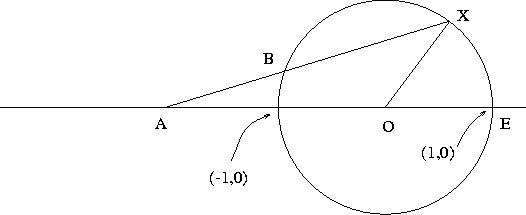![]()
This problem, together with Doubling the Cube, Constructing the regular Heptagon and Squaring the Circle were posed by the Greeks in antiquity, and remained open until modern times.
The solution to all of them is rather inelegant from a geometric perspective. No geometric proof has been offered [check?], however, a very clever solution was found using fairly basic results from extension fields and modern algebra.
It turns out that trisecting the angle is equivalent to solving
a cubic equation. Constructions with ruler and compass may
only compute the solution of a limited set of such equations,
even when restricted to integer coefficients. In particular,
the equation for ![]() degrees cannot be solved by
ruler and compass and thus the trisection of the angle is not
possible.
degrees cannot be solved by
ruler and compass and thus the trisection of the angle is not
possible.
It is possible to trisect an angle using a compass and a ruler marked in 2 places.
Suppose X is a point on the unit circle such that ![]() is
the angle we would like to ``trisect''. Draw a line AX through a
point A on the x-axis such that |AB| = 1 (which is the same as
the radius of the circle), where B is the intersection-point of the
line AX with the circle.
is
the angle we would like to ``trisect''. Draw a line AX through a
point A on the x-axis such that |AB| = 1 (which is the same as
the radius of the circle), where B is the intersection-point of the
line AX with the circle.

Figure 7.1: Trisection of the Angle with a marked ruler
Let ![]() be
be ![]() .
Then
.
Then ![]() , and
, and ![]()
Since the sum of the internal angles of a triangle equals ![]() radians (180 degrees) we have
radians (180 degrees) we have ![]() , implying
, implying ![]() . Also, we have that
. Also, we have that
![]() , implying
, implying ![]() . Since both quantities are equal to
. Since both quantities are equal to ![]() we obtain
we obtain
![]()
From which
![]()
follows. QED.